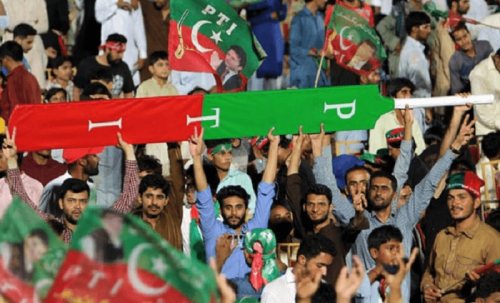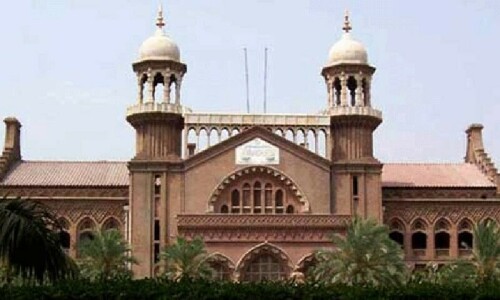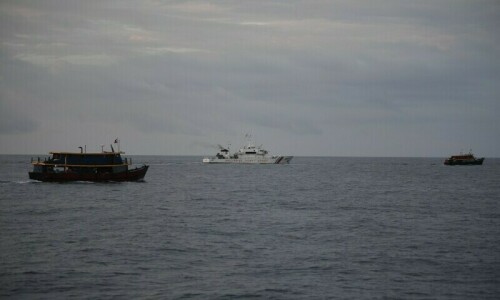• Ex-PM also serving sentence for two corruption cases, facing 150 other charges
• Qureshi appears poised to return to political arena after securing bail
ISLAMABAD: Imran Khan’s journey to freedom remains arduous despite bail granted by the Supreme Court in the cipher case on Friday because of his ongoing incarceration in two other corruption references and about 150 other cases registered at police stations across the country.
Shah Mehmood Qureshi, on the other hand, appears poised for a swift return to the political arena after securing bail.
Besides, the Supreme Court’s ruling supersedes the Islamabad High Court’s (IHC) previous order directing the special court to conclude the cipher case trial within four weeks. This could potentially decelerate the trial’s progress.
IHC Chief Justice Aamer Farooq had earlier dismissed Mr Khan’s petitions for acquittal and bail in the cipher case on Oct 27. Mr Shah Mehmood QureshiKhan and Mr Qureshi’s counsel subsequently challenged this dismissal.
Arrested since Aug 20 in the cipher case, Mr Qureshi was also implicated in nine FIRs for alleged involvement in violent protests.
In two FIRs registered with Police Station Khanna, the anti-terrorism court (ATC) of Islamabad in September dismissed his bail plea for non-prosecution as he was confined at Adiala Jail and could not appear before the judge, Abual Hasnat Zulqarnain.
According to Ali Bukhari, Mr Qureshi’s counsel, the order dismissing his client’s bail petition was challenged before the IHC and the matter was referred to the ATC again.
The ATC judge then granted bail to Mr Qureshi in both FIRs, he said, adding that there was nothing against the former minister to justify his confinement.
He said the legal team has applied for a certified copy of the Supreme Court’s judgment to deposit surety bonds for Mr Qureshi.
Political analysts speculate that Mr Qureshi’s release might lead to a shift in PTI’s leadership dynamics, with the outgoing chairman, Barrister Gohar Ali Khan, potentially becoming irrelevant.
Mr Qureshi, previously a strong candidate for PTI’s chairmanship, had his candidacy withdrawn due to the risk of conviction in the cipher case.
Sources said that Barrister Hamid Khan was also offered the chairmanship post, but he excused himself because of his professional commitments, after which Barrister Gohar’s name was finalised.
Meanwhile, former premier Imran Khan faces an uphill battle with his ongoing arrest in two NAB references — Toshakhana and £190 million corruption.
NAB Chairman Nazir Ahmed Butt has issued Mr Khan’s arrest warrants in both cases.
Both cases are pending before Islamabad’s accountability court, where Judge Mohammad Bashir will hear the bail pleas on Dec 23 and Dec 27.
A NAB prosecutor indicated that the accountability court might take at least a month to decide the bail plea in one case. Besides, the dismissal of bail can be challenged before the IHC, which can take another month or so to decide the matter.
Under the National Accountability Ordinance, the accountability court could not entertain the bail plea. However, an amendment to the law introduced by the previous government led by the Pakistan Democratic Movement (PDM) empowered the accountability judge with bail-granting power.
In August, Accountability Judge Mohammad Bashir dismissed Mr Khan’s bail plea for non-prosecution. However, the IHC division bench reinstated the petition and referred it to the accountability court for a rehearing.
The NAB prosecutor said that unless the accountability court and the IHC decided the bail expeditiously, Mr Khan could not come out of the jail before mid-February.
However, PTI’ spokesperson Shoaib Shaheen has expressed hope that Mr Khan will be released from jail before the upcoming general elections.
Mr Shaheen argued that Judge Bashir could grant bail to Mr Khan in both cases, enabling him to lead the PTI’s election campaign.
However, if the accountability court dismissed the bail plea, it would be highly unlikely for Mr Khan to get bail from the IHC or the Supreme Court before the elections due to paucity of time, Mr Shaheen said.
He claimed that the £190m settlement case was without any substance, whereas in the Toshakhana case, in which Mr Khan is accused of not declaring state gifts and selling them at a huge premium, NAB did not accuse those responsible for determining the price.
As far as 150 other cases registered against Mr Khan in Islamabad and other provinces, legal experts say that the former premier is not likely to be arrested in these cases.
Among these cases, 46 are registered with the Islamabad Police, according to a senior official of the Islamabad Police. The arrest of Mr Khan in these cases is unlikely, as he is already on bail in most of them.
Published in Dawn, December 23rd, 2023















































Dear visitor, the comments section is undergoing an overhaul and will return soon.